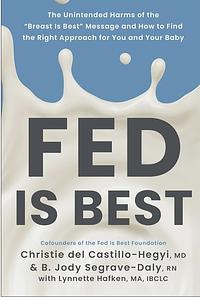You need to sign in or sign up before continuing.
Take a photo of a barcode or cover
I needed this book 6 years ago before my first baby was born. It would have saved me a lot of tears, shame and stress.
Would 100 percent recommend for any first time parents wanting to learn more about infant feeding.
Would 100 percent recommend for any first time parents wanting to learn more about infant feeding.
informative
medium-paced
Fed Is Best makes a compelling case for prioritizing calories over the feeding mode of choice, especially in the fragile early days of an infant’s life. The authors lay out persuasive evidence that the “breast is best” messaging can create unnecessary stress for new parents and can even be medically dangerous in the first week as transitional milk comes in for breastfeeding people. I was interested to learn about how many cultures around the world have actually supplemented breast milk in various ways throughout recorded history. From my own experience starting breastfeeding with my first baby just a couple weeks after finishing this book, I thought the beginning sections might have been a little on the fear-mongering side, as every medical professional and lactation consultant we worked with really erred on the side of caution and encouraged supplementing with formula during that transition time. That said, I was glad to have read this book so I knew what to expect with the triple feeding regimen we were put on the first week, and it helped build my awareness of how important supplementing was for our jaundiced baby. The authors include lots of helpful material and charts in the book as well, though I would have preferred footnotes/endnotes and appendices rather than QR codes to a separate website.
My thanks to the publisher for sending me a review copy of this book.
My thanks to the publisher for sending me a review copy of this book.
informative
challenging
informative
sad
informative
slow-paced
This book will be published on June 24, 2024. Thank you to the publisher for sending me an early review copy at my request!
If you are expecting a baby, this book is required reading. Full stop.
Fed Is Best is an incredibly thorough, helpful, carefully researched book that presents the most current data on breastfeeding, formula feeding, and combination feeding in a way that respects every person’s autonomy and informed choice. Its thesis is that when it comes to feeding, the most dangerous thing you can do is underfeed an infant. Unfortunately, that’s happening a LOT right now.
I’m currently pregnant with my first, and I’ve been very selective about what I read in preparation. I picked up this book because I don’t think that exclusive breastfeeding will be best for my mental health; I want to be able to share feeding responsibilities with my partner, sleep at night without having to pump to keep up my supply, and generally regain autonomy of my body. But of course, I also want my baby to be as healthy as possible. So I went looking for science and evidence to inform my path forward. That is exactly what I got with this book.
To be clear: This book is NOT anti-breastfeeding in any way. There is plenty of advice and information here for people who want to breastfeed. The authors’ position is simply that it is more important for an infant to get enough to eat than it is for them to be exclusively breastfed. To emphasize that point, they debunk a lot of misinformation about how critical breastfeeding really is.
Here are just a few things I learned in part 1 of the book:
- Exclusive breastfeeding (EBF) is far and away the #1 risk factor for infants being rehospitalized after birth.
- Before today’s cultural emphasis on breastfeeding began, only 6% of newborns were diagnosed with what used to be called “breastfeeding jaundice” and is now called “suboptimal feeding jaundice.” Today that number is more like 30% (!).
- That’s because, contrary to what new parents are often told, an infant’s stomach IS big enough to consume more than the small amounts of colostrum a birthing parent produces in the first few days after birth. Underfeeding them is extremely dangerous and can lead to serious health issues, permanent brain damage, and worse.
- What’s more, 60% (!!) of first-time birthing parents who are at least 30 years old experience delays in full milk production.
- Virtually all of the health and development benefits of breastfeeding disappear from scientific results when you control for household income and education.
- “Baby-friendly” hospitals are financially incentivized to have higher rates of parents and infants EBFing when discharged, and nurses are often penalized for suggesting supplementation.
In part 2 of the book, the authors give you all the information you need to know about feeding, including techniques for boosting or reducing milk production, pumping techniques and cadence, formula preparation, and more. Plus, there are QR codes throughout the book that lead to even MORE information on the Fed Is Best website. I am very glad to have this resource in hand heading into everything that is to come.
Graphic: Child death, Medical content, Pregnancy


